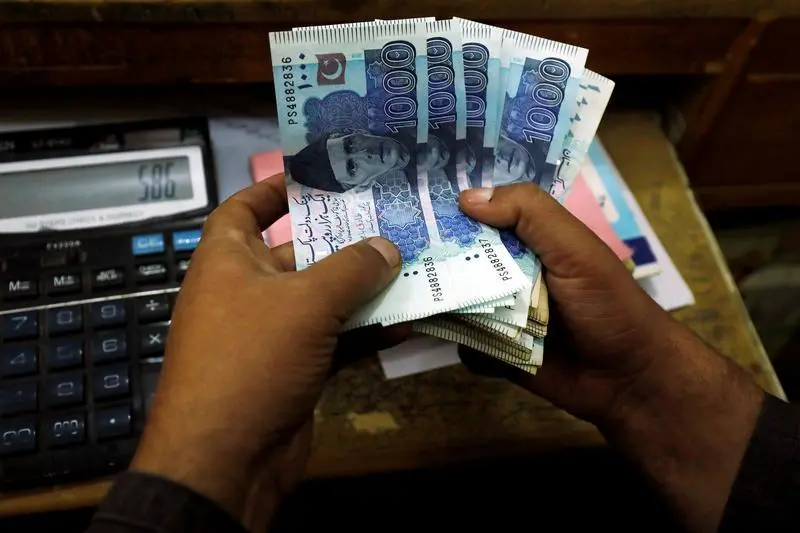PHOTO
The Pakistani rupee continued its free fall against the US dollar as it surpassed a major psychological barrier on Thursday by crossing 200 mark (54.5 against the dirham) in the interbank market for the first time in the history of the country.
The local currency remained on a slippery path with a fresh decline of 0.81 per cent, or Rs1.7, against the greenback as it resumed trading from Wednesday's closing at Rs198.39 and closed at Rs200.
It remained under pressure throughout the day despite a suspected intervention from the State Bank of Pakistan as the demand was high in the market due to uncertainty on political and economic fronts.
The rupee sustained the downward trend on the ninth consecutive working day as it cumulatively lost 6.75 per cent, or Rs12.67, since May 9. The currency hit a record low of Rs187.53 (51.09 against the dirham) on May 9 and then plunged to Rs190.02 (51.77 against the dirham) on May 11.
The local currency remained under pressure and dropped to Rs192.53 (52.46 against the dirham) on May 13, sank below Rs194.19 (52.91 against the dirham) on May 16, declined to Rs198.40 (54.05 against the dirham) on May 18 and ended at Rs200.2 (54.55 against the dirham) on Thursday (May 19).
IMF talks resume
The recent rupee decline came despite a positive development on the economic front as Pakistan resumed talks with the International Monetary Fund (IMF) in Doha on Thursday to revive $6 billion extended fund facility.
Analysts and market insiders said the talks with IMF are very crucial to restore the confidence of investor and other multinational lenders, but they expressed their doubt that the week-long negotiations are unlikely to conclude on positive note due to the government's reluctance to withdraw subsidies on petrol, gas and electricity — a prerequisite condition from the IMF to revive the loan programme.
Samiullah Tariq, head of research at Pak-Kuwait Investment Company, said the rupee is in a free fall against the US dollar and other major currencies due to uncertainty over IMF talks started today in Doha.
"Withdrawal of subsidies on petroleum products is an essential part of the IMF talks and it seems an uphill task to convince the fund’s officials and get a positive outcome without a firm plan to phase out subsidies on petrol and electricity," Tariq told Khaleej Times on Thursday.
He said the revival of the IMF package is essential to meet external funding requirements as well as restore investors’ confidence on the Pakistan economy.
"No financial help from other multinational lenders and friendly nations is possible unless we conclude positive talks with the IMF," Tariq said.
The rupee shed 27.07 per cent of its value against the US dollar since the beginning of financial year 2021-22. It ended at Rs157.54 (42.92 against the dirham) in previous year of 2020-21 on June 30.
Copyright © 2022 Khaleej Times. All Rights Reserved. Provided by SyndiGate Media Inc. (Syndigate.info).





















